MercoPress. South Atlantic News Agency
Paraguay
-
Wednesday, August 8th 2012 - 07:12 UTC
Unasur special committee presents this week report on Paraguay’s political situation
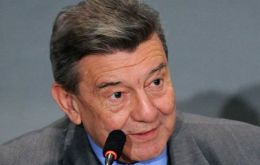
The special Unasur commission that is monitoring and following political events in Paraguay since the removal of Fernando Lugo as president and his replacement by Federico Franco, is expected to make a first presentation next Thursday said Peruvian Foreign affairs minister Rafael Roncagliolo.
-
Wednesday, August 8th 2012 - 06:37 UTC
Brazil begins major military exercise to test security along its southern borders
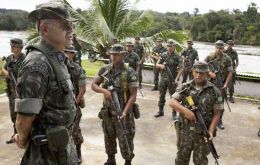
Brazilian Armed Forces began this week a major deployment along the borders of Uruguay, Argentina, Paraguay and Bolivia involving 9.000 troops from the three services with the purpose of testing border security against smugglers mainly of arms and drugs and organized crime, said the Ministry of Defence.
-
Tuesday, August 7th 2012 - 20:14 UTC
Mercosur has only benefited Brazil in the last ten years with a surplus of 36.8bn
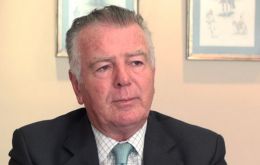
Brazil is the only country that in the last ten years has benefited from Mercosur with an intra-zone trade surplus of 36.8 billion dollars while the other three full members, Argentina, Uruguay and Paraguay have accumulated huge deficits in the same period, according to Argentine economist Orlando Ferreres a regular columnist from La Nacion with graduate studies in Harvard.
-
Tuesday, August 7th 2012 - 08:45 UTC
Removed Paraguayan president says he can run again for the Executive office
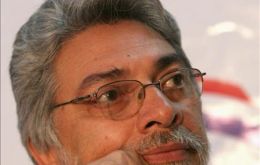
Former Paraguayan president Fernando Lugo who was removed from office last June following a political impeachment in Congress said he can again be a presidential candidate in the coming April elections.
-
Monday, August 6th 2012 - 08:14 UTC
Lugo going to appeal before the Inter American Court his removal from office
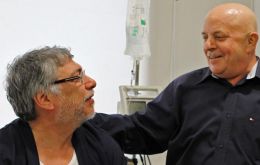
Fernando Lugo said he would appeal to the Inter American Court the whole political impeachment process in the Senate that ended with his removal from the Paraguayan presidency in less than 48 hours and with little chance of a defence.
-
Monday, August 6th 2012 - 08:07 UTC
Ex-president says inclusion of Venezuela in Mercosur is “favourable for Uruguay”
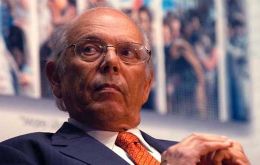
Former president Jorge Batlle (2000/2005) said that the inclusion of Venezuela in Mercosur “is favourable for Uruguay” but at the same time insisted it was “wrongly done” for not having taken into account Paraguay’s opposition currently suspended as member of the regional block.
-
Saturday, August 4th 2012 - 03:14 UTC
Venezuela accession to Mercosur “by the back door”, according to The Economist
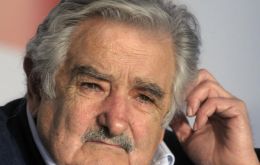
Under the heading of “In by the back door” referred to the expansion of Mercosur, The Economist says “bringing Venezuela certainly was smart, in the sense of cunning rather than wise”, but it was done ignoring the block’s rules which call for unanimity in admitting new members.
-
Saturday, August 4th 2012 - 02:18 UTC
Paraguayan senators challenge Chavez version of attempted bribes to favour Venezuela
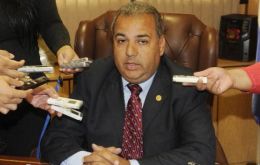
An international controversy has surfaced between President Hugo Chavez and Paraguayan senators as to who really tried to bribe whom regarding failed attempts to have Venezuela incorporated to Mercosur.
-
Friday, August 3rd 2012 - 08:20 UTC
Chavez claims Paraguayan senators tried to blackmail him to vote for Venezuela in Mercosur
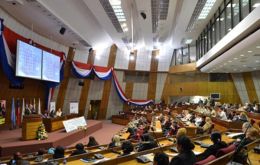
President Hugo Chavez said that the incorporation of Venezuela to Mercosur was “exemplary” because it never yielded to “blackmail” from the Paraguayan extreme right and revealed that he met with Paraguayan Senator Lino Oviedo, considered the mastermind behind those attempts.
-
Thursday, August 2nd 2012 - 07:38 UTC
Paraguay urges OAS to take a position on the country’s situation
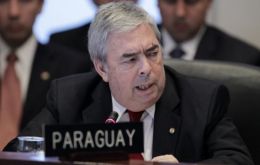
Paraguay urged the Organization of American States, OAS, on Wednesday to say whether it will be taking measures or not against the country following the removal of Fernando Lugo from the presidency, a political incident that has reverberated in the whole continent.
